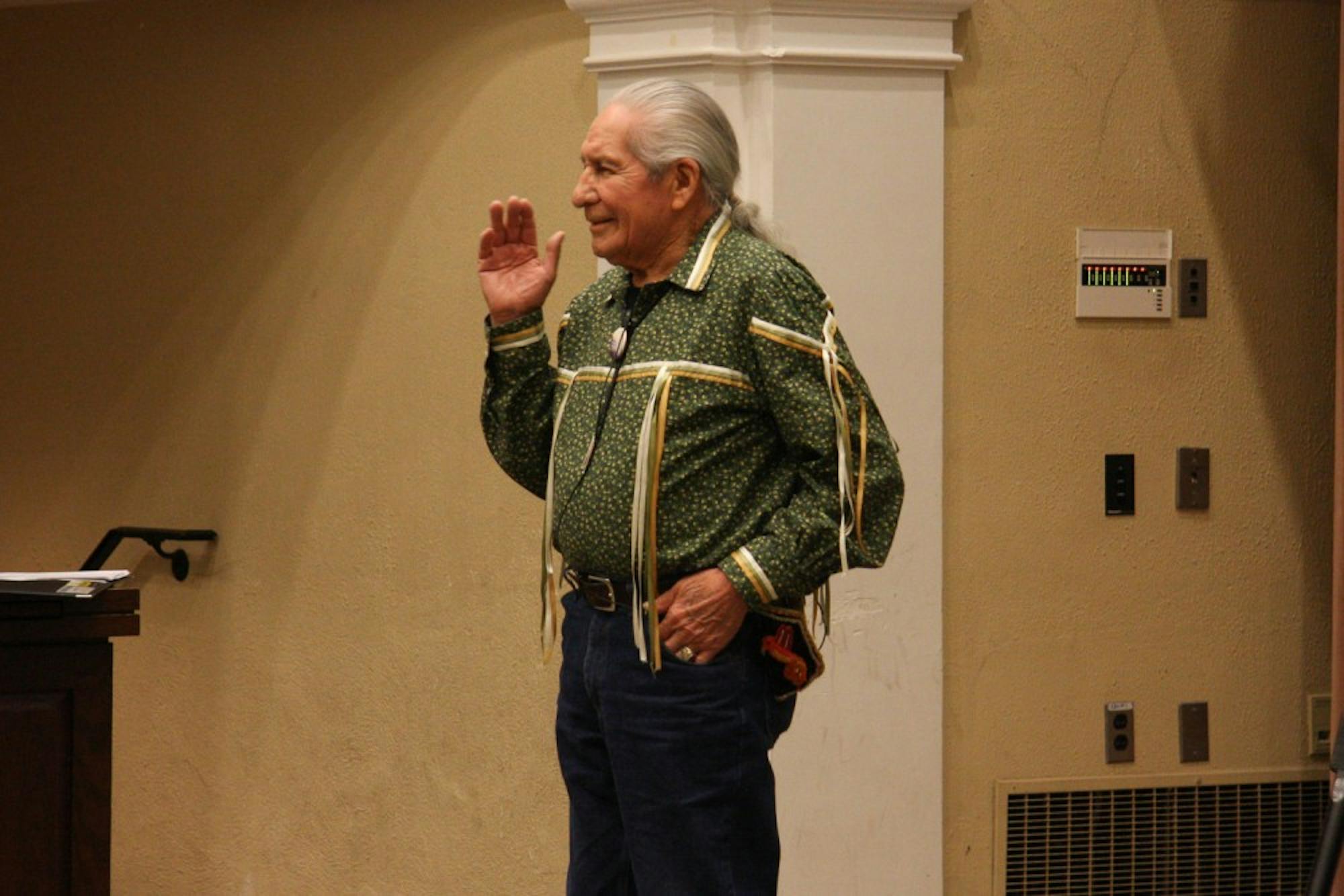When Oren Lyons, Honorable Onondaga Elder, heard that President Barack Obama called the United States the world’s first constitutional democratic government, he felt the need to set the record straight. The Iroquois Confederacy, established 800 years before the United States, was the first democracy to use a constitution.
“People wouldn’t know that because as far as the world is concerned [the United States] is where democracy is born,” Lyons said.
In a lecture Monday, Lyons discussed how the origins of the United States and its conception of democracy were deeply influenced by the Iroquois Confederacy and the struggles Native Americans have overcome in the domestic and international arena.
Lyons said the United States was not a true democracy until the 20th century.
“Fifty percent of the population was not voting,” Lyons said. “You can’t call that a democracy. Come on, President.”
It was not until the 1920s that the United States reached the Iroquois Confederacy’s level of gender equality in the political sphere, Lyons said.
The United States used Iroquois principles and rules of peace, equity and fair treatment of its citizens when crafting the Constitution, although significant differences between the two governments exist, he said.
The Iroquois confederacy and the American colonies had a very close relationship. Chiefs advised American government officials to create a confederacy like theirs because their system had worked for hundreds of years. The founding fathers took this advice when they decided to create a constitutional congress, he said.
One of the main differences between the two systems is that Americans tried to shortcut the process of consensus that is characteristic of the Iroquois Confederacy. In addition, in the Iroquois government, while politicians are chosen by the community, they are not paid. Iroquois government is rooted in a desire to serve one’s community, he said.
Unlike in Congress, where women only hold 18 percent of seats, the Iroquois government has a strong female presence. Its highest ranking member is the clan mother, who is in charge of nominating political leaders then confirmed or denied by the larger community.
Lyons discussed the values that the Iroquois community deemed important when they formed their confederacy. He said respect for other communities played a major role in shaping the government and that the Iroquois had to wait and be recognized by members of other clans before entering their land.
The Iroquois Confederacy is the last traditional Native American government that retains its sovereignty in the United States today, Lyons said.
“We certainly don’t take direction from Washington,” he said.
The Iroquois are very fortunate to have kept their system truly democratic, Lyons said. The system includes all members of the community and one of its key beliefs is embracing the community and letting everyone have a political voice.
“What does a community mean? It means we work together for the common good,” he said. “Common goods include clean water, air and a place to live.”
The Iroquois believe nature and the earth are part of the community and have been closely tied to the earth, but Western civilizations do not understand how interconnected humans are with nature, Lyons said.
“It’s a relationship that you can’t forget, like your family,” he said.
Most accounts of American history begin with Christopher Columbus’ discovery in 1492 and do not consider the native inhabitants that were in America before the Europeans arrived, an inaccurate representation, Lyons said. When Lyons asked audience members if they were aware that in 1493, the Pope declared the recently discovered American lands to be empty because there were no Christian nations there, few people raised their hands.
Following remarks on Iroquois governance, Lyons added that the Obama administration is not doing enough to combat climate change and called on Dartmouth students to take action, saying that responsibility to act on the issue rests in the “shoes” of students.
Margaret Rauner ’17 said that she found the lecture interesting because it offered a new perspective.
“I thought it was very empowering especially towards the end with his comment that these are your shoes and you can handle them,” she said.
Lyons is a Faithkeeper of the Turtle Clan of the Onondaga and Seneca nations of the Iroquois Confederacy and is in charge of upholding their history and traditions.
He helped establish the United Nations working group on indigenous peoples in 1982 and is a former professor of American Studies and the director of the Native American Studies program at the State University of New York-Buffalo.
Lyons is one of the keynote speakers of the Indigenous Peoples’ Climate Change Working Group conference, which is being held at Dartmouth on Nov. 4 and 5.




